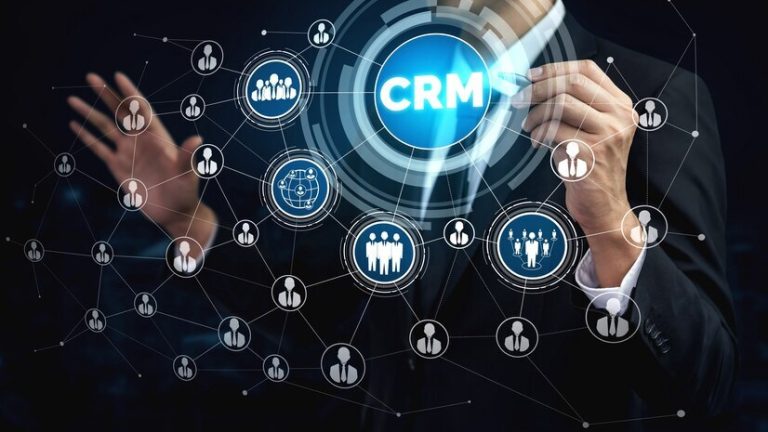As a large business, managing customer relationships is a crucial aspect of your success. Customer relationship management (CRM) systems are designed to streamline your interactions with customers, improve your marketing strategies, and boost your sales.
However, with a plethora of CRM options available on the market, selecting the best one can be overwhelming.
In this blog post, we will explore the best CRM systems for a large business. We will consider factors such as scalability, customizability, integration, automation, and pricing to identify the top contenders.
Our aim is to help you make an informed decision that will align with your business needs and goals.
So, let’s dive in and find the CRM system that best fits your business requirements.
1. Keep Your Goals in Mind.
Before you start looking for CRMs, it’s important to make sure that your goals are SMART. This acronym stands for:
- Specific – Your goal must be clear and concise. You should know exactly what it is that you’re trying to achieve, as well as how long it will take you to do so.
- Measurable – Your desired outcome should have a specific number attached to it (for example: “I want my sales team members on average to sell two new customers per day.”)
- Achievable – Once this goal has been set and measurable in terms of time frame and resources available at your disposal, then we can talk about how realistic or difficult the task may be!
2. Look at the Features of the Product.
When you’re thinking of choosing the best CRM system for a large business, it’s important to look at the features that are important to you and your customers. You should also make sure that the product has integrations with other software.
- Identify your business needs: Before evaluating the features of an enterprise CRM, you should first identify your business needs and objectives. This will help you determine which features are essential to your business and which ones are not.
- User-friendliness: The CRM system should be user-friendly and easy to navigate. The interface should be intuitive and provide easy access to all the features and functionalities.
- Customization: Look for a CRM that can be customized to meet the unique needs of your business. This includes the ability to add custom fields, create custom workflows, and tailor reports to meet specific business requirements.
- Integration capabilities: The CRM should have the ability to integrate with other business systems such as marketing automation, accounting software, and customer support tools. This will help streamline your business processes and improve efficiency.
- Analytics and reporting: The CRM should offer robust analytics and reporting capabilities that provide insight into customer behavior, sales trends, and other key performance indicators. This data will help you make informed business decisions and improve your sales and marketing strategies.
- Mobile capabilities: In today’s mobile-first world, it’s important to choose a CRM that offers mobile capabilities. This will allow your sales team to access customer data, update records, and manage tasks while on the go.
- Security and data privacy: Finally, the CRM should have robust security features that protect your customer data and ensure compliance with data privacy regulations such as GDPR and CCPA. Look for features such as data encryption, user authentication, and role-based access control.
3. Make Sure That Your Data Will Be Secure, Private and Available to Everyone.
Data security is a major concern for any business. A CRM system must be secure and private if it’s going to be useful for your company.
To ensure that your data is secure, private and available to everyone, you’ll need to take several steps:
- Have a good understanding of how the system works before implementing it in production
- Make sure that all users have read access permissions. So, they can modify their own information (and only them). This will help prevent unauthorized changes from being made by someone else who shouldn’t have accesses those records
4. Subscription-based or Perpetual License
You may have heard that subscription-based licenses are cheaper than perpetual licenses. This is true, but there are some important differences between the two types of license.
A subscription-based license is usually more flexible because you can cancel it at any time without incurring any penalties.You’ll be able to continue using your software for as long as you want (or until the end of your contract).
However, if your organization grows or needs more features in future releases or even just doesn’t like how something works.It’s unlikely that anyone will be able to help out with bug fixes or new releases. Because their support team has already moved on with their lives after completing one project cycle.
A perpetual license also costs less upfront but can be expensive over time because there’s no way for them to know when it’s time for upgrades unless they manually check every single instance of an application across all machines in production today.
In fact, many companies choose this option in order not only because they don’t want surprises but also so their employees aren’t wasting time trying to figure out where everything went wrong during testing phases before launch day arrives!
5. Get an Overview of the Market.
Before you can choose the right CRM for your business, it’s important to get an overview of the market. You want to know what your competitor is doing and how they are doing it, as well as what sort of solutions are available in your industry.
For example, let’s say that you’re interested in building a platform that helps small businesses manage their sales pipeline while keeping track of client information like contact details and past orders. So, they can be easily integrated with existing systems like Google Sheets or Salesforce Chatter.
6. Determine Your Target Client.
Knowing your target client is the first step to choosing the right CRM solution for enterprise. What are their needs, goals and expectations? What features will be most important to them in this CRM solution? How do they use it? If you’re not sure about these things, it’s time to start asking questions!
The best way to do this is by talking with your clients and customers as well as doing research online. You can also ask other people who use similar software or services what they think about their current CRMs’ strengths and weaknesses
7. Select the Right Fit for Your Enterprise Needs.
When you’re choosing a CRM, it’s important to choose the right product for your enterprise needs. There are many different types of CRMs available and they each have their own strengths and weaknesses.
To select the best fit for your enterprise, consider these factors:
- It meets your needs
- Easy to use
- It comes with good reputations
- It is reliable and scalable in terms of growth potential
8. Understand the Primary Features You Need in a CRM Software Solution.
Now that you have a general idea of what capabilities are important to your company, it’s time to take a look at each category.
- User interface: The user interface is the front end of your CRM software and will be where most of the action happens. It should be easy-to-use and intuitive. So that non-techy employees can use it without getting tripped up by technical jargon or confusing icons. It also needs to provide real-time access across multiple devices (phones, computers).
- Reporting capabilities: Reporting functionality is an essential part of any good CRM solution. Many companies overlook until they get into trouble because they’ve relied on outdated reports for too long! Poor reporting means lost opportunities for sales growth; but great reporting can help identify trends in customer behavior. So, you can better serve them over time.
9. Evaluate the Competition.
Before you make your final decision, it’s important to evaluate each product. First, look at the features of each product.
- Is it designed for small businesses?
- Is it a subscription-based or perpetual license?
- What happens if you don’t use the CRM after a year?
- Do they offer any kind of trial period or free version, so that you can see firsthand how well it works without having to pay up front?
Next, consider what would happen if your business didn’t use this particular CRM system–or any other one at all! How does having such a tool in place benefit your company and its workers?
5 Best CRM System for a Large Business
If you’re looking for the best CRM system for enterprise then take a look at these 5 CRM from the leading company.
1. HubSpot Sales Hub
HubSpot Sales Hub is a powerful sales tool that offers a wide range of features and benefits to help businesses streamline their sales process, improve productivity, and drive revenue growth.
Here are some of the reasons why businesses may choose to use HubSpot Sales Hub:
- All-in-one sales platform: HubSpot Sales Hub offers a complete suite of sales tools, including CRM, sales automation, email tracking, and reporting, all in one place. This means that businesses can manage their entire sales process in one platform, eliminating the need for multiple tools and systems.
- Easy to use: It is designed to be user-friendly, with an intuitive interface and simple navigation. This makes it easy for sales teams to learn and use, reducing the learning curve and improving productivity.
- Customizable: It offers a range of customization options, allowing businesses to tailor the platform to their specific needs. This includes custom fields, workflows, and reports, as well as the ability to integrate with other tools and systems.
- Sales automation: It offers powerful automation tools that can help businesses streamline sales processes, reduce manual tasks, and improve efficiency. This includes automated lead nurturing, email sequences, and follow-up tasks.
- Advanced analytics: It provides detailed analytics and reporting, giving businesses insight into their sales performance and the effectiveness of their sales process. This includes data on leads, deals, sales activity, and more.
- Integrations: It integrates with a wide range of other tools and systems, including marketing automation, e-commerce, and customer service platforms. This allows businesses to create a seamless workflow across all aspects of their business.
2. Freshwork CRM
It is a CRM platform that offers a range of features and benefits to help businesses improve their sales and customer service processes.
Here are some of the reasons why businesses may choose to use Freshworks CRM:
- Comprehensive sales and marketing tools: Freshworks CRM offers a range of tools to help businesses manage their sales and marketing processes, including lead and deal management, email campaigns, and website visitor tracking. This allows businesses to create a cohesive sales and marketing strategy and manage their customer interactions in one platform.
- Easy to use: It is designed to be user-friendly, with an intuitive interface and simple navigation. This makes it easy for sales and marketing teams to learn and use, reducing the learning curve and improving productivity.
- Customizable: It offers a range of customization options, allowing businesses to tailor the platform to their specific needs. This includes custom fields, workflows, and reports, as well as the ability to integrate with other tools and systems.
- Artificial Intelligence-powered features: It includes AI-powered features such as lead scoring, contact enrichment, and predictive analytics. These features help businesses make data-driven decisions, automate processes, and improve the accuracy of their sales forecasting.
- Advanced analytics: It provides detailed analytics and reporting, giving businesses insight into their sales and marketing performance and the effectiveness of their customer engagement strategies.
3. Pipedrive
Pipedrive is another popular customer relationship management platform that is designed specifically for sales teams.
Here are some of the reasons why businesses may choose to use Pipedrive CRM:
- Sales-focused: Pipedrive is designed to help sales teams manage their pipeline and prioritize their deals. The platform provides an easy-to-use visual pipeline that allows users to see where their deals are in the sales process and identify opportunities for improvement.
- Customizable: It offers a range of customization options, allowing businesses to tailor the platform to their specific needs. This includes custom fields, workflows, and reports, as well as the ability to integrate with other tools and systems.
- Easy to use: Pipedrive is designed to be user-friendly, with an intuitive interface and simple navigation. This makes it easy for sales teams to learn and use, reducing the learning curve and improving productivity.
- Sales automation: It offers powerful automation tools that can help businesses streamline their sales process, reduce manual tasks, and improve efficiency. This includes automated lead nurturing, email sequences, and follow-up tasks.
- Advanced analytics: It provides detailed analytics and reporting, giving businesses insight into their sales performance and the effectiveness of their sales process. This includes data on leads, deals, sales activity, and more.
4. Zoho CRM
Zoho CRM is a comprehensive CRM platform that offers a range of features and benefits to help businesses improve their sales, marketing, and customer service processes.
Here are some of the reasons why businesses may choose to use Zoho CRM:
- Comprehensive sales and marketing tools: Zoho CRM offers a range of tools to help businesses manage their sales and marketing processes, including lead and deal management, email campaigns, and website visitor tracking. This allows businesses to create a cohesive sales and marketing strategy and manage their customer interactions in one platform.
- Customizable: It offers a range of customization options, allowing businesses to tailor the platform to their specific needs. This includes custom fields, workflows, and reports, as well as the ability to integrate with other tools and systems.
- Artificial Intelligence-powered features: It includes AI-powered features such as lead scoring, contact enrichment, and predictive analytics.
- Advanced analytics: It provides detailed analytics and reporting, giving businesses insight into their sales and marketing performance and the effectiveness of customer engagement strategies.
- Integration options: It integrates with a range of other tools and systems, including marketing automation, e-commerce, and customer service platforms. This allows businesses to create a seamless workflow across all aspects of their business.
5. Zendesk Sell
Zendesk Sell is an excellent CRM platform that is designed specifically for sales teams. Here are some of the reasons why businesses may choose to use Zendesk Sell CRM:
- Sales-focused: Zendesk Sell is designed to help sales teams manage their pipeline and prioritize their deals. The platform provides an easy-to-use visual pipeline that allows users to see where their deals are in the sales process and identify opportunities for improvement.
- Sales automation: It offers powerful automation tools that can help businesses streamline their sales process, reduce manual tasks, and improve efficiency.
- Customizable: It offers a range of customization options, allowing businesses to tailor the platform to their specific needs. This includes custom fields, workflows, and reports, as well as the ability to integrate with other tools and systems.
- Advanced analytics: It provides detailed analytics and reporting, giving businesses insight into their sales performance and the effectiveness of their sales process. This includes data on leads, deals, sales activity, and more.
Conclusion
Selecting the best CRM system for a large business can be a daunting task, but it is a critical decision that will impact your customer engagement, sales, and marketing strategies. It is important to evaluate your business needs, goals, and budget carefully before making a decision.
After considering all factors, we have identified HubSpot as the best CRM systems for enterprise. HubSpot offers a free version, intuitive interface, and all-in-one marketing, sales, and service tools.
Ultimately, the best CRM system for your business will depend on your unique requirements and objectives. We recommend conducting a thorough evaluation of each system’s features and capabilities to make an informed decision that will support your business growth and success.
Sign up HubSpot CRM and enjoy FREE trial.





